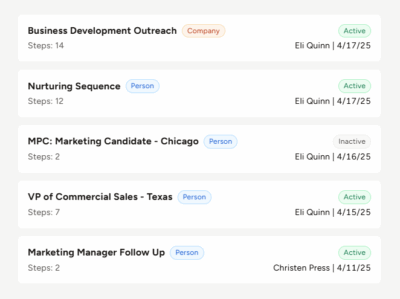In today’s dynamic and competitive talent acquisition landscape, executive recruiters and search consultants are continually challenged to find innovative ways to attract top talent, meet client demands, and maintain a competitive edge. In this pursuit, Customer Relationship Management (CRM) software emerges as a vital tool, offering the potential to revolutionize recruitment processes and drive better outcomes. However, to fully leverage CRM’s capabilities, it’s crucial for recruitment agencies to adopt CRM best practices that align with their strategic objectives.
In this blog post, we’re going to provide executive recruiters and search consultants with actionable insights and strategies to maximize the use of CRM effectively. By understanding CRM’s role in recruitment, segmenting databases for targeted outreach, implementing effective follow-up strategies, and providing personalized experiences for candidates and clients, recruitment agencies can optimize their recruitment efforts and achieve sustainable success.
Understanding the Role of CRM in Recruitment
CRM software serves as the backbone of recruitment operations, providing a centralized platform for managing candidate and client relationships, storing critical data, and facilitating communication. Its multifaceted functionalities enable recruitment agencies to streamline processes, enhance efficiency, and deliver exceptional service throughout the recruitment lifecycle.
To effectively utilize recruiter CRM, it’s essential to comprehend its fundamental role in recruitment and leverage its features strategically. CRM enables recruitment agencies to accomplish the following items.
Centralize Data
At the heart of CRM lies its ability to centralize candidate and client information, offering recruiters a comprehensive view of their contacts.
By consolidating data such as resumes, job preferences, communication history, and feedback into a single database, CRM empowers recruiters to make informed decisions and deliver personalized experiences. This centralized repository facilitates seamless access to critical information, enabling recruiters to engage with candidates and clients more effectively.
Streamline Communication
CRM software streamlines communication by providing a unified platform for interactions between recruiters, candidates, and clients.
Through various channels such as email, phone calls, and messaging, CRM ensures that all communications are logged, tracked, and accessible. This fosters continuity and consistency in communication efforts, allowing recruiters to maintain seamless engagement throughout the recruitment process.
Automate Tasks
Automation is a key feature of CRM, enabling recruitment agencies to automate routine tasks and workflows.
From sending follow-up emails to scheduling appointments and updating contact information, CRM automates repetitive processes, saving recruiters time and effort. By automating administrative tasks, recruiters can focus on high-value activities such as building relationships, conducting interviews, and devising recruitment strategies.
Gain Insights
CRM provides valuable insights into recruitment performance, candidate behavior, and client preferences through its analytics and reporting tools.
By analyzing key metrics such as time-to-fill, candidate quality, and conversion rates, recruiters can identify trends, optimize processes, and drive continuous improvement. These insights empower recruiters to make data-driven decisions, enabling them to refine their recruitment strategies and achieve better outcomes.
CRM Recruitment Best Practices: Targeted Outreach
Segmentation is a fundamental aspect of effective recruitment marketing, allowing recruiters to tailor their outreach efforts to specific audience segments based on relevant criteria. By segmenting candidate and client databases, recruitment agencies can deliver more targeted and personalized communication, resulting in higher engagement and conversion rates.
Here’s how recruitment agencies can segment databases for targeted outreach:
Define Segmentation Criteria
Before segmenting databases, recruiters should define clear criteria based on factors such as job role, industry, geographical location, and level of experience.
This ensures that segments are relevant and aligned with recruitment objectives. By identifying distinct segmentation criteria, recruiters can create meaningful segments that resonate with their target audience.
Utilize Custom Fields
CRM systems offer the flexibility to create custom fields, allowing recruiters to capture specific information about candidates and clients.
By utilizing custom fields to categorize contacts based on their unique attributes and preferences, recruiters can enhance segmentation accuracy. Custom fields enable recruiters to capture detailed information that goes beyond standard database fields, providing deeper insights into candidate and client profiles.
Leverage Tags and Labels
Tags and labels are valuable tools for categorizing contacts within CRM systems.
By assigning tags and labels to contacts based on relevant keywords or attributes, recruiters can organize contacts into distinct groups. Tags and labels enable recruiters to easily filter and segment databases for targeted outreach, ensuring that communications are tailored to the specific needs and interests of each audience segment.
Regularly Update Segments
Maintaining database segments is an ongoing process that requires regular review and updates. As candidate and client information changes over time, recruiters must ensure that segments remain accurate and up-to-date. By regularly reviewing and updating segments based on changes in contact status or preferences, recruiters can ensure that outreach efforts remain relevant and effective.
Implementing Effective Follow-Up Strategies
Effective follow-up is essential for nurturing relationships with candidates and clients throughout the recruitment process.
Recruiting CRM software can streamline follow-up activities by automating reminders, tracking interactions, and facilitating personalized communication. Here are some best practices for implementing effective follow-up strategies using CRM:
Set Reminders and Notifications
CRM’s reminder and notification features are invaluable for scheduling follow-up tasks and alerts for important milestones such as candidate interviews, client meetings, and follow-up calls.
By setting reminders and notifications, recruiters can ensure that follow-up activities are conducted in a timely manner and nothing falls through the cracks. This helps recruiters stay organized and proactive in their follow-up efforts.
Personalize Communication
Personalization is key to building rapport and fostering engagement with candidates and clients. CRM enables recruiters to personalize follow-up emails, messages, and calls based on the recipient’s interests, preferences, and previous interactions.
By incorporating relevant details such as job preferences, interview feedback, and upcoming opportunities, recruiters can make follow-up communication more meaningful and impactful. Personalized communication demonstrates to candidates and clients that their needs and preferences are valued, fostering stronger relationships.
Track Interaction History
CRM systems maintain a comprehensive record of all interactions with candidates and clients, including emails, calls, meetings, and notes. By leveraging this information, recruiters can track interaction history and ensure that follow-up activities are aligned with previous conversations and actions.
This helps to avoid duplication of efforts and ensures a seamless and consistent experience for candidates and clients. By referencing past interactions, recruiters can tailor follow-up communication to each contact’s specific needs and preferences, enhancing the overall recruitment experience.
Automate Follow-Up Workflows
CRM’s automation capabilities enable recruiters to streamline follow-up workflows and ensure consistent communication with candidates and clients. By setting up automated follow-up sequences for tasks such as sending thank-you emails after interviews, scheduling follow-up calls at regular intervals, and sending updates on job opportunities, recruiters can save time and increase efficiency.
Automation helps to maintain momentum in the recruitment process, ensuring that candidates and clients receive timely and relevant follow-up communication. By automating routine follow-up tasks, recruiters can focus their time and energy on more strategic activities that drive recruitment success.
CRM Recruitment Best Practices: Personalized Experiences
Personalization is essential for delivering exceptional experiences to candidates and clients, and CRM plays a central role in making this possible.
By leveraging CRM data and insights, recruitment agencies can tailor their interactions, recommendations, and services to meet the unique needs and preferences of individual contacts. Here are some CRM recruitment best practices for providing personalized candidate and client experiences:
Capture Comprehensive Data
CRM serves as a centralized repository for storing and organizing data about candidates and clients. To provide personalized experiences, recruiters must capture comprehensive data that goes beyond basic contact information.
By capturing details such as job preferences, skills, experiences, communication history, and feedback, recruiters can gain a deeper understanding of each contact’s unique profile. This enables recruiters to deliver personalized experiences that are tailored to the specific needs and preferences of individual candidates and clients.
Segment and Target Communications
Segmentation is essential for delivering targeted and personalized communication to candidates and clients. By segmenting candidate and client databases based on relevant criteria such as job role, industry, location, and level of experience, recruiters can tailor their communication strategies and content to different audience segments.
This ensures that messages are relevant, timely, and engaging, increasing the likelihood of engagement and conversion. By targeting communications to specific audience segments, recruiters can deliver more personalized experiences that resonate with candidates and clients on a deeper level.
Recommend Relevant Opportunities
CRM’s candidate matching capabilities enable recruiters to recommend relevant job opportunities to candidates based on their skills, experiences, and preferences. By leveraging CRM’s advanced search and filtering features, recruiters can identify suitable matches between candidates and job openings, taking into account factors such as job requirements, location, and company culture.
By recommending relevant opportunities, recruiters can help candidates discover opportunities that align with their career goals and aspirations. This increases the likelihood of successful placements and enhances the overall candidate experience.
Customize Service Offerings
Personalization extends beyond candidate recommendations to include customized service offerings for clients. By leveraging CRM insights, recruiters can identify opportunities for value-added services such as talent pipelining, market insights, and recruitment strategy consulting.
By tailoring service proposals and recommendations to address clients’ unique challenges and objectives, recruiters can demonstrate their expertise and commitment to client success. This helps to strengthen the recruiter-client relationship and build trust and credibility over time.
CRM software offers unparalleled capabilities for executive recruiters and search consultants seeking to optimize their recruitment efforts. By understanding CRM’s role in recruitment, segmenting databases for targeted outreach, implementing effective follow-up strategies, and providing personalized experiences for candidates and clients, recruitment agencies can maximize the value of CRM and achieve sustainable success.
By adopting recruitment CRM best practices and leveraging CRM as a strategic tool, executive recruiters and search consultants can gain a competitive edge, drive better outcomes, and build lasting relationships with candidates and clients alike. As recruitment continues to evolve, CRM will remain a critical component of successful recruitment strategies, enabling recruitment agencies to adapt to changing market dynamics and achieve their recruitment goals.








